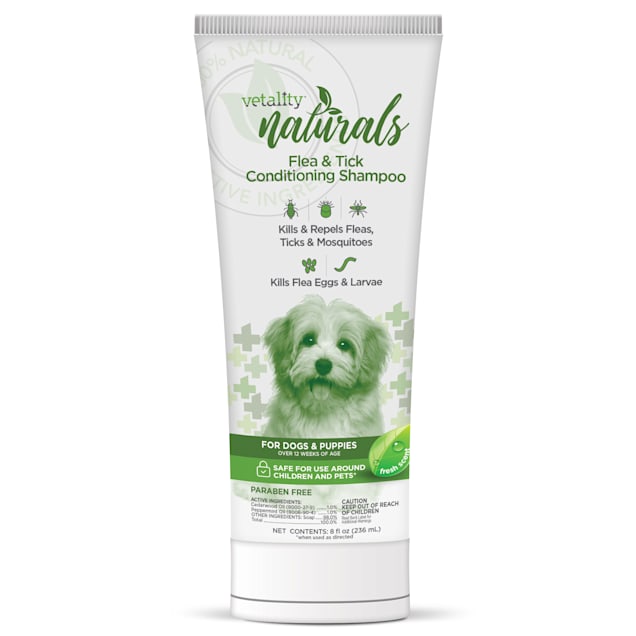To keep ticks off dogs, regularly check and groom them, use tick preventatives like medication or collars. Ticks can pose serious health risks to dogs, including transmitting diseases like Lyme disease and Rocky Mountain spotted fever.
By employing preventative measures and staying vigilant, you can protect your furry friend from these harmful parasites. We will explore effective ways to keep ticks off dogs, from using natural remedies to commercial products. Keeping ticks at bay will ensure your dog’s wellbeing and allow them to enjoy a healthy, tick-free life.
Let’s dive into these strategies to safeguard your canine companion from the dangers of tick infestations.

Understanding Ticks
Tick prevention is crucial for the well-being of your furry friend. Ticks are small, blood-sucking parasites that can transmit various diseases to dogs.
Types Of Ticks
- Dog Ticks
- Deer Ticks
- American Dog Ticks
Dangers Of Tick Infestation
- Tick-Borne Diseases: Ticks can transmit illnesses like Lyme disease and Anaplasmosis.
- Secondary Infections: Tick bites can lead to skin infections if not treated promptly.
- Anemia: Severe tick infestations can cause anemia in dogs.
Regularly check your dog for ticks and use preventive measures to keep them safe and healthy.

Credit: www.petco.com
Signs Of Tick Infestation
Tick infestations in dogs can have serious health consequences if left untreated. By being aware of the signs of tick infestations, you can take prompt action to protect your furry friend.
Physical Symptoms
Physical symptoms of tick infestation in dogs include redness, swelling, and irritation around the bite area.
Behavioral Changes
Behavioral changes such as excessive scratching, restlessness, or agitation can indicate a tick infestation in dogs.
Ticks Prevention Methods
Ticks prevention is crucial for ensuring the health and well-being of our furry companions. By implementing effective preventive measures, pet owners can keep their dogs safe from the risks posed by these blood-sucking parasites. Here are some proven methods to keep ticks off dogs:
Regular Check-ups
Regularly checking your dog for ticks can significantly reduce the chances of a tick infestation. After spending time outdoors, examine your dog’s entire body, paying close attention to the ears, neck, and feet. If you find any ticks, use a pair of fine-tipped tweezers to carefully remove them, ensuring to grasp the tick as close to the skin as possible and pulling it straight out with steady, even pressure.
Tick-repellent Products
Using tick-repellent products such as spot-on treatments, collars, sprays, or oral medications can provide an added layer of defense. These products are designed to deter ticks from latching onto your dog and may offer long-lasting protection against infestations. Be sure to consult with your veterinarian to determine the most suitable tick prevention products for your furry friend.

Credit: www.heysigmund.com
Natural Tick Control
Ticks can be a nuisance for dogs, but there are effective ways to keep these pesky creatures at bay. Natural tick control methods are a popular choice among dog owners who want to avoid harsh chemicals and formulas. In this post, we will explore two main approaches to natural tick control: DIY tick repellents and natural remedies.
Diy Tick Repellents
Creating your own tick repellents is not only cost-effective but also allows you to have control over the ingredients used. Here are a few DIY tick repellents you can easily make at home:
- Apple Cider Vinegar Spray: Mix equal parts of water and organic apple cider vinegar in a spray bottle. Apply this solution to your dog’s coat before going out for walks. Ticks dislike the smell of apple cider vinegar, making it an effective natural repellent.
- Essential Oil Blend: Combine a few drops of essential oils such as cedarwood, lavender, and lemongrass with a carrier oil like coconut or almond oil. Apply this mixture to your dog’s collar or bandana to repel ticks.
- Herbal Spray: Boil a handful of fresh rosemary, peppermint, and sage in water for about 10 minutes. Once cooled, strain the liquid and pour it into a spray bottle. Spritz this herbal spray on your dog’s fur to keep ticks away.
Natural Remedies
In addition to DIY tick repellents, there are several natural remedies that can help prevent ticks on dogs:
- Frequent Brushing: Regularly brush your dog’s coat to remove any ticks that may have attached themselves. Comb through the fur carefully, paying attention to areas like the ears, underbelly, and between the toes.
- Diatomaceous Earth: Spread food-grade diatomaceous earth in your yard, focusing on areas where ticks are likely to thrive. This mineral powder damages the tick’s exoskeleton, effectively killing them.
- Nematodes in the Garden: Introduce beneficial nematodes to your garden or outdoor spaces. These microscopic worms prey on tick larvae and can help keep their population in check.
Remember that while natural options can be effective, it’s important to stay vigilant and continue to check your dog for ticks, especially after spending time outdoors. If you do find a tick on your furry friend, consult your veterinarian for safe removal methods.
Veterinary Intervention
Veterinary intervention plays a crucial role in keeping ticks off dogs and preventing the transmission of tick-borne diseases. Seeking professional help from a veterinarian ensures that you are taking the necessary steps to protect your furry friend from ticks. This section will discuss two main aspects of veterinary intervention: professional tick treatment and vaccination options.
Professional Tick Treatment
Professional tick treatment provided by veterinarians is one of the most effective ways to keep ticks off dogs. Veterinarians are equipped with the knowledge and experience to identify tick infestations and provide appropriate treatments. They may recommend various tick preventive products such as topical treatments, oral medications, or tick collars.
Topical treatments: These are applied directly to your dog’s skin, usually between the shoulder blades. These treatments contain special ingredients that repel ticks and kill them on contact. They provide long-lasting protection and are easy to apply. Examples of popular topical treatments include Frontline Plus and Advantix.
Oral medications: These are taken orally and work from the inside out. Once ingested, these medications travel through your dog’s bloodstream, killing ticks when they attach and start feeding. Oral medications are convenient and eliminate the need for applying products to your dog’s skin. Bravecto and NexGard are two commonly prescribed oral tick preventives.
Tick collars: These collars are impregnated with tick repellent chemicals that kill ticks on contact and provide continuous protection for several months. Tick collars are easy to use and an excellent option for dogs that are resistant to topical treatments or cannot tolerate oral medications.
Vaccination Options
Vaccinating your dog against tick-borne diseases is an essential aspect of veterinary intervention. Some ticks carry dangerous pathogens that can cause illnesses such as Lyme disease, Ehrlichiosis, or Anaplasmosis. Vaccines are available to help protect dogs from specific tick-borne diseases, and your veterinarian can recommend the most suitable options for your furry friend.
Lyme Disease Vaccine: This vaccine helps protect against Lyme disease, a tick-borne illness caused by Borrelia burgdorferi bacteria. It is especially important for dogs in areas where Lyme disease is prevalent.
Ehrlichiosis Vaccine: Ehrlichiosis is a potentially serious disease caused by the Ehrlichia canis bacteria. Vaccinating your dog against Ehrlichiosis can reduce the risk of infection and its associated complications.
Anaplasmosis Vaccine: Anaplasmosis is caused by the Anaplasma phagocytophilum bacteria and can lead to severe illness if left untreated. Vaccinating your dog against Anaplasmosis can provide an additional layer of protection.
Note: Vaccines are not available for all tick-borne diseases, and preventing tick bites through tick control measures is still crucial. Consult with your veterinarian to determine the best vaccination options for your dog.

Credit: www.amazon.com
Frequently Asked Questions For How To Keep Ticks Off Dogs Effective Ways
How Can I Prevent Ticks From Infesting My Dog?
To prevent ticks from infesting your dog, regularly check their fur for any ticks and remove them immediately. Use tick prevention treatments such as topical spot-on treatments or tick collars recommended by your veterinarian. Keep the grass in your yard trimmed and create a tick-free zone around your home by removing leaf litter and keeping a barrier of wood chips or gravel.
What Are Some Natural Remedies For Keeping Ticks Off Dogs?
Some natural remedies for keeping ticks off dogs include using essential oils like lavender, eucalyptus, and lemon. Dilute the oils with water and spray the mixture on your dog’s fur. You can also try adding apple cider vinegar to their water or using a tick repellent spray with ingredients like neem oil or rosemary.
Can Ticks Cause Health Problems In Dogs?
Yes, ticks can cause various health problems in dogs. They can transmit diseases such as Lyme disease, Rocky Mountain spotted fever, and Ehrlichiosis. These diseases can cause symptoms like fever, loss of appetite, joint pain, and lethargy. It is important to protect your dog from ticks to prevent these health issues.
Conclusion
To keep ticks off dogs, it’s crucial to follow a proactive approach to tick prevention. Regular tick checks, using tick repellents, and maintaining a tick-free environment are paramount. By implementing these strategies, pet owners can ensure their dogs stay protected from tick-borne diseases.
Prioritizing tick prevention is key to maintaining a healthy and happy furry companion.